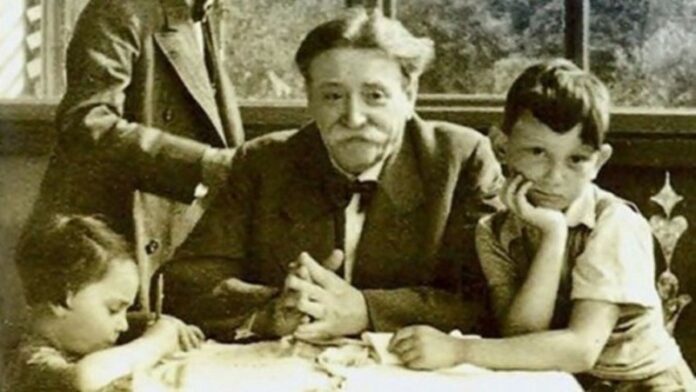As most of you might have heard, Hitler was not very fond of Jews. However, there was one exception – the Edeljude.
Dr. Eduard Bloch – a Jewish veteran of the Austrian army – was the Hitlers’ family physician, when Adolph was a child.
The good doctor took care of Hitler’s father, Aloys Hitler, and later his mother, Clara, who suffered from breast cancer and died in severe anguish. Her condition required taking daily, expensive, medication. Because of the Hitlers’ poor economic situation, the golden-heart doctor charged reduced prices, sometimes taking no fee at all.
After the annexation of Austria, Hitler awarded Bloch special protection from the Gestapo.
Adolf Hitler’s hatred towards Jews is well-known. However, there was one Jewish man whom Hitler admired and respected – Dr. Eduard Bloch, the Jewish physician who had taken care of Hitler’s family when he was a child. In this article, we will delve into the life of Dr. Bloch, his relationship with the Hitler family, and the unusual bond that he shared with the man who would go on to become one of history’s most notorious dictators.
Dr. Eduard Bloch: Early Life and Career
Dr. Eduard Bloch was born in 1872 in Austria, the son of a Jewish textile merchant. He studied medicine at the University of Vienna and, after completing his studies, he served as a medical officer in the Austrian army during World War I. It was during this time that he met the Hitler family for the first time.
Dr. Bloch and the Hitler Family
In 1903, when Hitler was only fourteen years old, his family moved to the town of Linz in Austria. It was there that they met Dr. Bloch, who became their family physician. Dr. Bloch was a kind and compassionate man who treated his patients with care and respect, regardless of their social status or religion.
When Hitler’s mother, Clara, was diagnosed with breast cancer, Dr. Bloch became her primary physician. Her condition was very serious, and she required daily medication that was expensive and hard to come by. However, Dr. Bloch charged the Hitlers reduced prices for the medication, sometimes even waiving his fee altogether.
Dr. Bloch’s Relationship with Hitler
Hitler was deeply grateful to Dr. Bloch for his care of the Hitler family. In fact, Hitler referred to Dr. Bloch as an “Edeljude”, or “noble Jew”, and he was the only Jew whom Hitler spoke of in positive terms. Hitler saw Dr. Bloch as an exception to the “Jewish problem” and viewed him as a symbol of the potential assimilation of Jews into German society.
However, after the annexation of Austria in 1938, Dr. Bloch’s relationship with Hitler changed. Hitler began to view all Jews as enemies of the state, and Dr. Bloch was no longer immune to the persecution that was taking place. Nevertheless, Hitler granted Dr. Bloch special protection from the Gestapo, allowing him to remain in Austria.
Dr. Bloch’s Emigration to the United States
In 1940, Hitler arranged for Dr. Bloch to emigrate to the United States. Dr. Bloch had been trying to leave Austria for some time, but it was Hitler’s intervention that finally allowed him to escape. The circumstances surrounding Dr. Bloch’s departure from Austria are unclear, but it is believed that he was able to take some of his possessions with him, including a valuable collection of antique books.
Dr. Bloch’s Role in American Intelligence
During World War II, American intelligence became interested in Dr. Bloch’s relationship with Hitler. In 1941 and 1943, they conducted interviews with Dr. Bloch, hoping to obtain information on Hitler’s childhood. Dr. Bloch provided valuable insights into Hitler’s personality and upbringing, although some of his accounts have been questioned by historians.
Dr. Bloch’s Memories of Hitler
After the war, Dr. Bloch published his memories of the encounter with young Hitler in which he painted a positive picture of future mass-murderer, saying that he was not a ruffian, untidy or impolite. He also said that Hitler’s mom would turn in her grave if she knew what he had become. In his memoirs, Dr. Bloch described Hitler as a polite and
well-mannered child who was respectful towards his elders. However, he also noted that Hitler had a tendency to be stubborn and was sometimes difficult to deal with. Dr. Bloch’s reflections on Hitler’s transformation into a mass-murderer were poignant and thought-provoking. He expressed deep regret at the way things had turned out, and it was clear that he had been deeply affected by the events of the war.
Conclusion
Dr. Eduard Bloch was a remarkable man who managed to maintain his humanity and compassion in the face of one of history’s greatest atrocities. His relationship with Hitler was complex and fraught with contradictions, but it is a reminder that human relationships can be more complicated than we sometimes imagine. Dr. Bloch’s story also highlights the importance of kindness and compassion in bridging divides and bringing people together.




